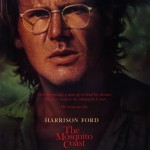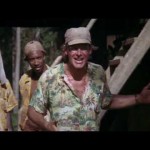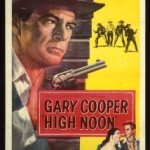“Look! He’s taking out the notebook!”
When I was a high school teacher in the 1990’s I would take my notebook to the theatre. I took notes about the movies I watched with a pen which “lit up” so I could see as I wrote. Inevitably, students from my school would attend the same showing. On numerous occasions, loud, excited, whispered voices erupted rows behind me:
“Look! He’s taking out the notebook!”
“Look! He’s taking out the notebook!” became the rallying cry for my young charges. When certain movies hit the big  screen, Mondays became “Movie-days.” Students wanted to talk about what they had seen and heard.
screen, Mondays became “Movie-days.” Students wanted to talk about what they had seen and heard.
I had been teaching students in class how to watch movies. It all began with Mosquito Coast (Peter Weir, 1986). Harrison Ford plays, Allie Fox; a tough, know-it-all, entrepreneurial scientist. Fox’s brilliant mechanical mind creates wonderful inventions. Fox also has a problem: he believes he can control his world. Early in the film, a local farmer explains Fox’s problem to his son.
“Your father is the worst kind of man. He is brilliant and sometimes right.”
 Consumed by the rightness his own knowledge, Allie Fox decides he knows better than the whole of American culture. So he leaves the United States, believing its corruption will spell its doom. Allie takes his family to Central America, to Mosquito Coast. There he and his loved ones literally hack out a living from the jungle.
Consumed by the rightness his own knowledge, Allie Fox decides he knows better than the whole of American culture. So he leaves the United States, believing its corruption will spell its doom. Allie takes his family to Central America, to Mosquito Coast. There he and his loved ones literally hack out a living from the jungle.
Fox creates his own city and culture. The film-goer is amazed as she watches a beautiful village spring out of the middle of nowhere. Fox’s ultimate creation, his ice-machine, brings benefits to all around. At the apex of his construction, we see a couple of indigenous people in a canoe paddling past the ice maker. It rises on a bluff above the river, a cathedral. The music and cinematography combine to create the aura of wonderment.
“This is why I have come!” Fox shouts, “Ice is civilization.”
 The native workers, his family, adore what he has created. But all is not well. Allie has a local nemesis. A preacher from Baltimore had decided to set up a church up river from Mosquito Coast. The Bible-thumping antagonist visits Fox’s compound one day. The scene is shot from behind Ford at hip level. A western gun slinger, Fox plays the heel of his hand against the hammer hanging off his belt. The camera catches the preacher some feet away. It is a showdown. Both men worship themselves, what they have created. But Fox hates the preacher and all he stands for. By movie’s end, the two men have their own “high noon.”
The native workers, his family, adore what he has created. But all is not well. Allie has a local nemesis. A preacher from Baltimore had decided to set up a church up river from Mosquito Coast. The Bible-thumping antagonist visits Fox’s compound one day. The scene is shot from behind Ford at hip level. A western gun slinger, Fox plays the heel of his hand against the hammer hanging off his belt. The camera catches the preacher some feet away. It is a showdown. Both men worship themselves, what they have created. But Fox hates the preacher and all he stands for. By movie’s end, the two men have their own “high noon.” 
Celebration turns to catastrophe, however, when Fox’s pride consumes him. His town is not enough. His creation does not satisfy. He must control more of the world. What Fox refuses to believe, what the movie-goer discovers, is that our world cannot be controlled. Sunny scenes turn cloudy, thunder rumbling in the distance.
“I remember Mosquito Coast and you walking around the room crying out, ‘Scene change! Notice the scene changes in a movie! The director does not put them in there for nothing!’ One of my former students recently commented on a movie essay. I could feel her smile emanating through her post on Facebook. “You taught us that we couldn’t just watch a movie. We had to think about movies. I tell my husband now about those days in your class. I will teach my children the same things.”
 “Look! He’s taking out the notebook!” became the rallying cry for watching movies with Eckel. We watched movies at the local theatre, in class, at my home.
“Look! He’s taking out the notebook!” became the rallying cry for watching movies with Eckel. We watched movies at the local theatre, in class, at my home.
I knew my responsibility was to prepare my students for what they would encounter in the world.
“Can I buy you lunch?” A student from those days invited me to chat just a couple of weeks ago. We reminisced about school. He told me about his vocation, future plans, and his family. “What do you remember about those days?” I asked. He grinned and said two words, “Mosquito Coast.” He continued, “I don’t remember everything about the movie or about your critique. But I do remember the educational process you impressed upon me. It wasn’t just about watching movies. It was about preparing for life.”
I smiled. I had renamed so-called “Bible classes” with the title “Christian Life and World Studies” or CLAWS for short. It was my interest then, it is my interest now, to prepare students for life. As I did then, I continue to affirm, 
Since my youth, God, you have taught me,
and to this day I declare your marvelous deeds.
Even when I am old and gray,
do not forsake me, my God,
till I declare your power to the next generation,
your mighty acts to all who are to come (Psalm 71:17-18, NIV)
Biblical truth intersects with all of life because this is God’s world. He has interpreted His Work in the world through His Word. My responsibility as a Christian teacher is to prepare my students for life.
 Movie watching is no different than any other activity. We view the world through the lens of His Word. The Word must always interpret the image.
Movie watching is no different than any other activity. We view the world through the lens of His Word. The Word must always interpret the image.
So take out your notebooks. Let’s get started.
Mark is always looking for paper to write on. Dr. Mark Eckel has taught junior high through graduate school students the same ideal: interpret everything Christianly.

